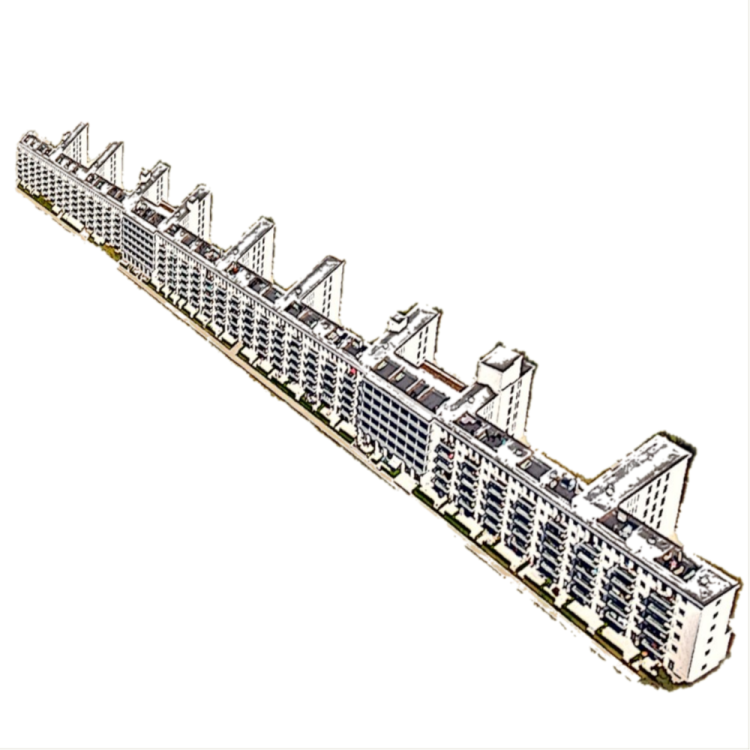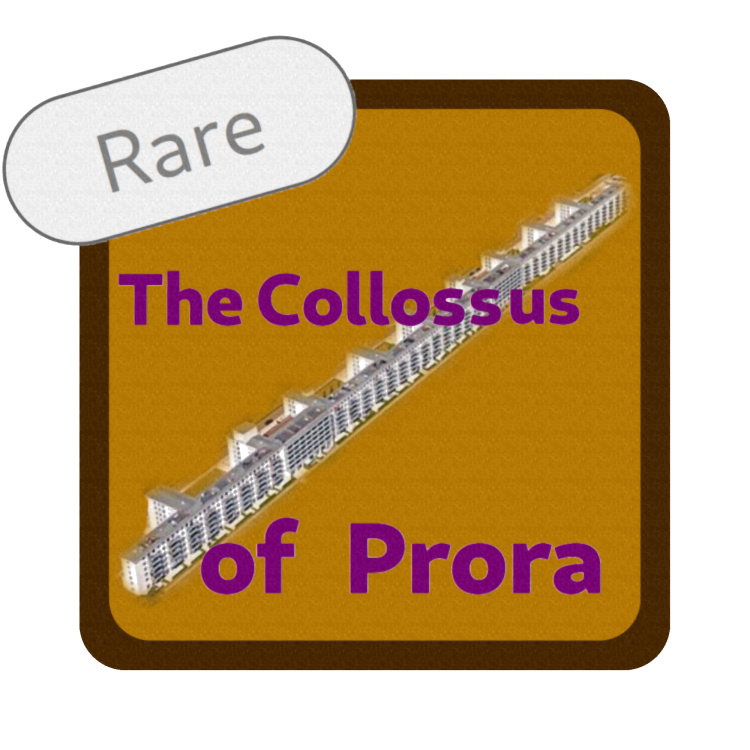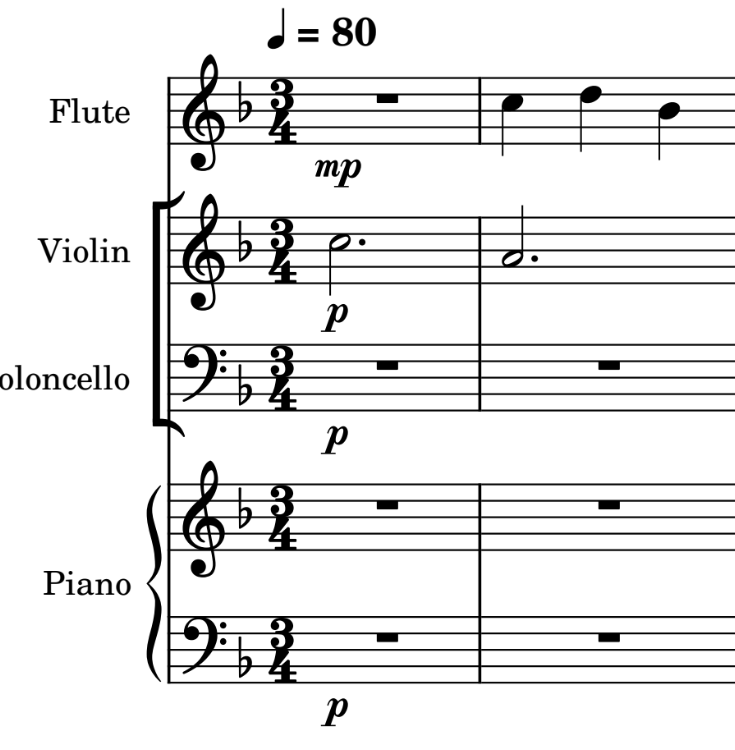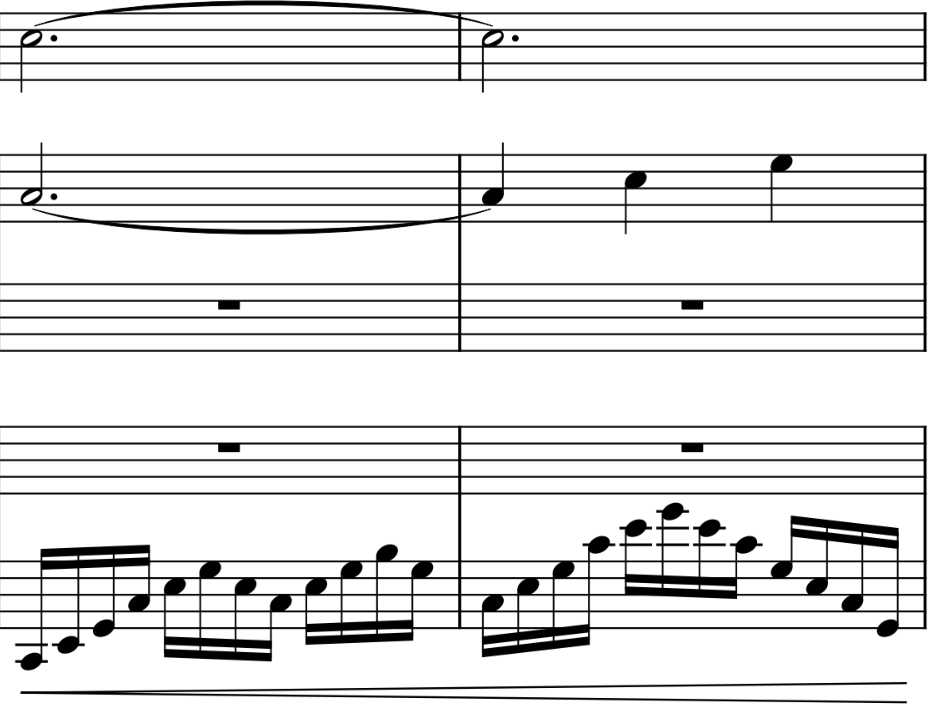Leaderboard
Popular Content
Showing content with the highest reputation since 02/05/2026 in all areas
-
Wow then I would get several of them for my works! My Clarinet Quintet is 62 minutes long so it will get 2 of them!!4 points
-
It's been a long time! I used to frequent this forum in my 20s, now I'm 42 years old, living abroad, haven't really written any music in the last decade, but I never fully gave up on writing music. It's time to fix my writer's block. I'm setting up this topic as a challenge to myself. Writing music in my 20s was something that came very slowly and painfully as I am a massive perfectionist and not terribly disciplined. So this plan is designed to cure me of that. - Only writing fragments for now. No aiming for completed pieces. - Focusing on practicing use of musical elements I like, experimentation over destination. - Loosely tracking my time in order to force something out the door, rather than get stuck on revisions. - Long term learning goal is to build the skills to write hybrid electronic/orchestral music for games. If anyone wants to take on this challenge with me, feel free, and you are welcome to post things here. For my part, the pacing is starting at one small post per week. As I feel able, I may increase that. Music will be hosted on flat.io and eventually Soundcloud, and linked here by Sunday evening USA-Eastern time, which is Monday morning my time. Feedback is welcomed, but I will be trying to take feedback lightly and focus on quantity of music creation, on volume, rather than refining the quality. First entry: https://flat.io/score/69930d12f4b7f4206442ca2c-sus-slash?sharingKey=4f68cd0e43730c91e48416b8978810ab0c63680a3161fb07fbfcbc75e85c135b02a6f15102ff10978621f147508f16a2ade8791783c86664bb7ed9f0e3b671f9 https://www.youtube.com/watch?v=14lZ2g_oCxI For this eight-bar melody, I chose the musical element described in the above youtube video - suspended chords above a slash bass note, essentially sparsely voiced tall chords. I wasn't following any particular progression principles, just whatever sounded good, but trying to follow the structure of the chords described in the video. Couldn't quite nail down the last chord, sorry it's unsatisfying, but according to the rules we are moving on!3 points
-
We staff have decided that it might be a good idea to open the awarding of badges up to the members, not just the staff. The staff aren't perfect and can sometimes miss some good opportunities to award badges to members for some of their excellent or distinctive content. So if you feel like you have been overlooked for an award you deserve - let us know! Tell us which piece you think deserves what kind of award/badge and why and we will consider granting it to you. You can also suggest awards for other fellow composers' works! Refer to the following list of manually awardable badges. If a badge doesn't exist for your particular achievement you can suggest new badges/awards in that thread:3 points
-
A four-part fugue exercise composed on a given subject, with no particular instrumentation in mind. Developing the subject contrapuntally wasn’t difficult, but after a while it became rather monotonous. The labels A1, A2, B1, etc. indicate the various fragments on which the episodes are built. (The slurs are only meant to highlight motifs for my own reference.)3 points
-
Hallo @Fermata! Your asking about the issue of „monotony“ in your fugue. Sometimes it is not an issue with the composition itself, but rather a question of the interpretation or recording. Since you are using four string instruments „played“ by your notation software, you „naturally“ encounter the problem that the entire piece sounds somewhat monotonous. Even real string instruments blend the sound very well, in my opinion, but are not as expressive for individual voices. I can imagine, when played on a piano, the impression would be totally different. As currently discussed in another thread @PeterthePapercomPoser suggested to improve the recording by “fine-tuning” the articulation, dynamics, and tempo for each individual hand or even voice. I also had a fugue which I considered to be „boring“ and I was nearly to get around and throw it away. But then I applied such tiny adjustments in the tempo, for example to make the first bar of the subject a little bit „swinging“, which dramatically changed the perception. Since I do so now with all of my piano works, I know that it is a lot of work to literally maintain two scores, one for the printout and one for the recording. But it's really worth the effort to achieve a sound that is much closer to a live performance. Concerning the composition „as is“, I think there are no issues. With a short overview on the score I see that you already applied the necessary counterpuntual techniques (such as tonal answer, a recurring countersubject, inversion, augmentation, stretto). As in 6/2 meter with mostly half and quarternotes (perhaps in an older, more Palestrinian style), it would be not appropriate to add passages (in episodes) or countersubjects with a faster rhythm. Perhaps one could introduce a kind of diminution which doesn’t increase the rhythmic pulse by doubling the speed but is merely a rhythmic variant of the original subject preserving the quarternotes as the fastest ones, finally resulting in a 1.5x diminution (such as in Bach’s D# minor fugue from the WTC1 BWV 853).3 points
-
Very nice dreamy, yet mysterious and passionate prelude! I like the frequent changes of the time signature. While initially looking complicated, the rhythm of the piece has an intuitive pulse and a continuous flow. I noticed, that your score is without a key signature. But since you often change harmony from keys with sharps to keys with flats, this decision avoids that the score is cluttered with natural signs. And when listening and reading the score I like that the more serene passages correspond with the flats, while the more passionate passages feature more sharps! In some bars, I would like to see more octave brackets to make it easier to read when playing. Personally, I refuse to read more than three or four ledger lines. However, I agree, that too many octave brackets disrupt the visual impression of the runs in the score. I completely agree with @PeterthePapercomPoser's suggestions for improving the recording by “fine-tuning” the articulation, dynamics, and tempo for each individual hand or even voice. Since I do this with my piano works, I know that it is a lot of work to literally maintain two scores, one for the printout and one for the recording. But it's really worth the effort to achieve a sound that is much closer to a live performance. Thank you for sharing!3 points
-
Hello @Alex Weidmann! Nice mysterious Prelude! I'm surprised that @Henry Ng Tsz Kiu hasn't reviewed it yet since it's in his favorite key! 🤣 I have a few technical nit-picks: I've recently changed the way I write for piano through Musescore Studio 4 which I think might benefit you to hear about. If you favor the Musesounds Piano as I now have come to prefer, then in order to have more control over balance between the most important melody notes and less important background chords/figurations, you could actually load up two (or more) separate pianos and change the way they're displayed in the Layout section of the program (by deleting the bass clef portion of the right hand piano and deleting the treble clef portion of the left hand one). Then, not only will you be able to change the balance between the hands in the mixer, but you'll be able to give separate dynamics to each hand - an amount of control which you would lack with just one grand-staff track. Although you'd have to put in pedal marks for both tracks, and hide them in the top track. As well as hiding dynamics that are redundant. But I think bringing out the most important notes in each chord and passage will greatly improve at least my impression of the work. Another thing is the tempo. I noticed that you're trying to create a sense of novelty through the use of unusual rhythms and meters. I think it could be even more effective if you included an ebb and flow to the tempo by simulating a sort of constant rubato with choice accel.'s and rit.'s here and there. I can refer you to examples in my own catalog if you'd like, where such rubato gives a very satisfying result (at least in my opinion) and cases where the piece would suffer greatly from the mechanicality of the rendition if not for the rubato. Some places to consider including an accel. and rit.: bar 30 accel. into 31 I think would be a nice paired with that crescendo you already have. Other than that, nice job! I also question the interruption of the expected 4/4 flow of the beginning melody with the 9/8 measure - I think that's unnecessary. Thanks for sharing!3 points
-
Hello I've recently decided to take orchestration seriously. Just as I did with counterpoint back in the day... Yes, although I study on my own, I have always been self-taught, at some point you need guidance from an expert. So I am taking a course in orchestration. It is really for a very small group (only four people), which means the feedback is very powerful, as each person's work is reviewed in depth. I've learned a lot about the classical style (paradigm: Mozart). Why and for what purpose each thing is used. And here I share my version (reviewed by my teacher) of the orchestration of the first movement of Mozart's Piano Sonata No. 5. Now I'm working on Mendelssohn.3 points
-
There gonna be this one guy who’s probably treating the badges like Pokémon3 points
-
3 points
-
“Good evening, dear friends. Here is the scherzo from my third Sonata. I hope you like it.”3 points
-
Hallo @PeterthePapercomPoser, I have created a PNG which could be used as basis for a badge. Some considerations: The original photo can be found at Wikimedia Commons under https://commons.wikimedia.org/wiki/File:20-07-06-Prora-RalfR-DJI_0120.jpg. Please check whether it can be used concerning the license conditions. I have nothing against a „Collossus of Prora“ badge, but I would remind that this building did not have the best reputation because of its „problematic“ history. Originally erected by the Nazis as a huge holiday resort for their „Kraft durch Freude“ (Strength Through Joy) project. After World War II it was used a long time as military barracks, first by the Soviet Army, than by the East German Volksarmee. Since the mid-1990s, it stood empty for a long time and was exposed to decay and vandalism. Now it is (at least partly) renovated and houses a hotel, apartments etc. A more detailed overview can be found at Wikipedia under https://en.wikipedia.org/wiki/Prora.3 points
-
3 points
-
3 points
-
Continuing with the Scale Materials Chapter in Persichetti's "20th Century Harmony" I wrote this Clarinet Quintet. The prompt was "8. Construct a solo clarinet line in the lydian mode supported by phrygian string quartet harmony. Set both the melody and harmony on the tonal center Bb." Thanks for listening and I hope you enjoy and let me know what you think!2 points
-
Hi to all my fellow musicians. Here's my latest piece for piano, that I spent the last two days writing. Haven't quite finished the phrasing and dynamics yet. I may possibly extend the work; but I'm not quite sure yet. Hopefully I haven't accidentally stolen ideas from other pieces I've heard? I know the initial chord progression of C#m to Am(maj7) came from a You Tube video; but can't remember which piece they were discussing. (Pretty sure it was from a film score; but can't remember which one.) Anyway, hope you like it. I wrote it for a concert in May. P.S. Can you guess which composer inspired me to write this? (N.B. Revised scores will be posted below.)2 points
-
It's been too long! I thought I would share this piece written for my theory and composition class at Berklee. We were asked to work with a couple of "exotic scales" from a selection including the whole-tone scale, the octatonic scale, and modes other than those derived from the major scale. I felt drawn to the Lydian Augmented and Spanish Phrygian modes. I ended up with a contrapuntal rock instrumental in rough ABCA' form. The A section is in B♭ Lydian Augmented, the B section is in G Spanish Phrygian, and the C section an unbroken transition into D Spanish Phrygian. Finally, I modulate with the common tones D and A back to B♭ Lydian Augmented, for the A' recapitulation. The title (Iridescence) was inspired by my understanding of modes as a concept. With many modes sharing the same collection of notes, the tonic note that each mode centers on is what makes it unique -- gives it a unique color. And, iridescence is when something appears in different colors depending on the angle of viewing. I see that as a fitting metaphor. The artwork is my own, made with ProCreate. I didn't paint it for this track, but as a birthday present for my mother, inspired by Kate Bush's song "Kite". She is a massive fan of Kate's and introduced me to her when I was a little girl. I rediscovered her recently and I've been spending a lot of time with her early work. My current favorite album is Never for Ever...whose influence I thought was bleeding into this track. So, in the end there is some relation. 🙂 I hope you enjoy! Any feedback on both the mix and composition is more than welcome. ~ GP P.S. I was required to include a detailed score for the assignment. It might be too precise for a rock track in general, but if enough people are interested I will upload that, too.2 points
-
Hi everyone, I finished a new piano piece called Cloud Ame and wanted to share. I hope you enjoy listening and welcome any feedback! Thank you2 points
-
2 points
-
I don't know why, but it sounds neoclassical to me. I imagine this piece in an 18th-century drawing room. I think it has an intimate, somewhat playful feel to it. Good work on these exercises.2 points
-
I‘m glad to hear that, and to see that you are not too „disappointed“ or overwhelmed by the discussions. Since I see that you are (again) in „good hands“ with @muchen_ continuing a detailed discussion, I will not go so much in detail, but give only some more general thoughts. I‘ve noticed your new version (v3.mp3 – not yet v3m.mp3). Will say that I put it together with the first one on my playlist and listened them, in a loop, perhaps a dozen times while walking. I do the same with my own compositions (where I use different piano soundfonts producing 10 different recordings of the same piece) and listen to them extensively while I take a long walk. This approach helps me to judge the piece whether it is fluent and I get distracted from my thoughts every time something „rattles“. Will say, a more relaxed review on the work thru listening only – being away from the score – is very useful to find out bars which need overhaul or get new ideas how a piece could be continued. Coming to the two versions of your invention I‘ve listened, I must say they are only slightly different (which is good in the sense that your corrections/modifications had no impact on the overall mood). The longer I listened them, the more I loved the subject with the repeated notes! Yes, in the first version there are the few bars, where the „octaves“ produced a bit „thin“ sound in the counterpoint. They have gone away in the newer version (what is good) except of – in my listening impression - two bars, one at the first subject entry in the lower voice and one bar nearly the end. So, I will now look to the score to see whether I can find out what I thought to have heard. ... The one bar which retains to sound „thin“ is bar 4 and the other one is bar 22. Yes there is an octave on an A on the second of the repeated notes. But I think, it‘s not the octave only - there are other ones on a C in bar 3, last of the repeated notes and on a F# in bar 5, second of the repeated notes – which don‘t need „correction“ in my listening impression. I think the „problem“ in bars 4 and 22 is more harmonic nature, I would replace the three sixteenth notes in the upper voice [G A B] with [E# F# G#] emphasizing the dissonance between B major and the four repeated A naturals. Because this was more detailed than I initially intended to be in this repost, so take it not too seriously. The more general question I have – and you probably have yourself – is what do you intend with, for example, this particular invention. If it is an exercise, you‘ll have learned something, especially about „octaves“ – and can leave it at that, going to the next one. But perhaps this is not the best idea to continue with the 1601st exercise, as you seems to me to be already somewhat „overteached“ and „overpracticed“. If you are about to create a „full fledged“ composition of it, we could further talk about episodes, cadences and a more elaborated ending. However, I suspect that you would prefer for that purpose another piece with a subject of your own, which than will be „complete your baby“. For that case, I would suggest you to put your composition in a more larger „framework“, such as in a cycle of, for example of six or twelve inventions, calling it somewhat like „Mein Notenbüchlein“ 😅. I think, that‘s quite enough for today! Greetings, Wieland.2 points
-
Hallo @TristanTheTristan! Even your Sonatina has a length of a Sonata, I think it was wise to call it „Sonatina“ only, due to its youthful spirit and its refrain from the drama and heaviness of a „full-fledged“ sonata. So it is a cheerful, enjoying piece at all! However, what refuses me to count it as a piece that I would enjoy to put in my playing list is its hyperactivity expressed by the much to fast and repeating passages with ornamentations (trills, tremolos etc.) which heavily remind me on your signature „TristanTheTristanTristanTheTristanTristanTheTristanTristanTheTristanTristanTheTristanTristanTheTristanTristanTheTristanTristanTheTristanTristanTheTristanTristanTheTristanTristanTheTristanTristanTheTristanTristanTheTristanTristanTheTristanTristanTheTristanTristanTheTristanTristanTheTristanTristanTheTristanTristanTheTristanTristanTheTristanTristanTheTristanTristanTheTristanTristanTheTristanTristanTheTristanTristanTheTristan ….“. I can therefore only emphasize @PeterthePapercomPoser' questions about playability for a human performer and would love to hear the piece as it would be interpreted by a real pianist, whether it's a live recording or a recording from a MIDI file. In the latter case, however, more sensitivity to the technical abilities of a human pianist and their enormous nuances in articulation, dynamics, tempo, etc. would be required.2 points
-
Symphony-Concerto In A Major For Electric Guitar And Orchestra-1 Free Sheet Music by Robert C. Fox for Various Instruments | Noteflight Symphony-Concerto In A Major For Electric Guitar And Orchestra-2 Free Sheet Music by Robert C. Fox for Various Instruments | Noteflight Symphony-Concerto In A Major For Electric Guitar And Orchestra-3 Free Sheet Music by Robert C. Fox for Various Instruments | Noteflight Symphony-Concerto In A Major For Electric Guitar And Orchestra-4 Free Sheet Music by Robert C. Fox for Various Instruments | Noteflight2 points
-
This time I wrote a piece inspired by an exercise from Chapter 2 of Persichetti's "20th Century Harmony" on Scale Materials for 2 Bb Sopranino Clarinets and Bb Bass Clarinet. The prompt was "14. Construct a canon for three clarinets in which each performer plays a different synthetic scale on a different tonic." Synthetic scales are scales that are "specially constructed, often non-traditional scales created by altering, adding, or omitting notes from standard diatonic (major/minor) scales." I chose to use the written C Acoustic Scale, F Ukrainian Dorian Scale, and B Phrygian/Dorian Scale. I've been told that I should have perhaps tried to choose scales that would sound more harmoniously with each other. But, funny enough, that's exactly what I was trying to do. I didn't choose scales at random but tried to tailor each part of the canon to the previous material by improvising a scale and only later figuring out what scale I was using. But let me know what you think! Thanks for listening! P.S.: I have added a 2nd version of the piece where I have changed the relations of the tonics to each other to be tertian rather than quartal as in the 1st version. In the 2nd version I use written C Acoustic Scale, E Ukrainian Dorian Scale, and G Phrygian/Dorian Scale. Let me know which you prefer!2 points
-
Hallo @Frederic Gill! I have read the thread about your „2-part invention in counterpoint“ and since there had already been lively discussions I decided to take a look on another piece which has not got a review yet. I like the motif (or „subject“) which is indeed somewhat „stubborn“ because of its repeated notes (but there are many famous fugues with repeated notes in the subject). And so, your decision to vary the motif sometimes to avoid that repeated notes is quite a good idea. The counterpoint is well chosen rhythmically, giving the entire piece a continuous flow and its „funny“ character. As far as I remember from the other thread, there were some dispute about „parallels“ and „octaves“ which was – also in my opinion – somewhat „overteaching“ (I couldn’t follow all arguments or „issues“ without going into detail too deep), so that I can understand that you’ve deleted most of the posts. But to be honest, after listening to your E minor invention, I can understand what the other commenters meant: Not „parallel octaves“ (or „parallel fifth“ as to be avoided in counterpoint generally) are problematic, but only the occurrence of the same note (in an octave) on a strong beat that makes the piece sound something „thin“ at that particular note. This is the case in a two-voice counterpoint only. If you had a third or fourth voice there would be enough harmonic material overall (and that might be the reason that writing a two-part fugue is much more challenging than a three- or four-voice fugue and why there are so few of them). I think, you can solve the problem, for example by varying your counter-motif in that places where it creates the octave. You will then lose the smooth motion at these points and have to insert a leap, but that might emphasize the humorous character of the entire piece!2 points
-
Well! That quite possibly might be the most interesting thing I've heard in a long time. A very tricky thing to put together. Myself, I've always found canons far more difficult to write effectively than fugues, so therefore I must commend you. This is a very effective little piece. I must say, I don't much care for the sopranino clarinet up top, far too shrill, and I find myself wondering if the whole top part mightn't sound better on a regular B-flat clarinet an octave down. I suppose the texture is more modern for it though as is, and therefore part of your plan. Great work!2 points
-
Thanks for your detailed thoughts! When I mentioned monotony, I was referring more to the process of working with a long, slow subject - after a while the contrapuntal development itself felt a bit repetitive to write. The fugue was an exercise I worked out on paper with pen, mainly as a kind of contrapuntal puzzle, which I've always enjoyed doing as a hobby. That said, you're absolutely right that the playback could be improved. I didn't add any articulation or dynamics, so the notation software makes everything sound much flatter than it would in a real performance. I'll try revising it along the lines you suggest to make it sound more natural. Thanks again for taking the time to comment!2 points
-
Here is a list of Manually-Awardable Badges that aren't directly related to a competition or event: Musical Debator Melophile Holding Strong Opinions History Buff Philosopher of Music Theory Buff Orchestration Buff Keen Ear Keen Eye Musicologist Ivory Tickler Symphonist Chamber Guru Troubadour Concertophile Outstanding Orchestrator Maestro Soloist Master of Improvisation Skilled Arranger Film Buff Video Game Buff You've Got Rhythm Got Published Got Performed Tune Smith Prolific Composer Counterpoint Wizard Sick Beats Period Composer Ardent Producer Hepcat Aleatoric Composer Bando Drum Major Pop Song Aficionado Brass Aficionado Woodwind Aficionado String Aficionado Film Composer Recording Artist Musical Dramatist Challenger Avid Listener Musical Socialite Ingenious Harmonizer Dance Music Impresario Headbanging Rocker Musical Storyteller Musical Explorer VGM Enthusiast Film Music Enthusiast Sculptor of Sound Audiophile Idea Peddler Star Performer Choir Master Musical Architect Immaculate Engraver Impeccable Taste Local Lurker Abstract Composer Guitar Guru Collaborator Accomplished Virtuoso Musical Advisor Elegant Classicist Amorous Romanticist Programmatic Composer Master of Subtlety Dedicatee Lo-Fi Audiophile Better Than Thatguy Lavender Hands Effect Ardent Reviewer The Colossus of Prora Feel free to suggest badges as well! - PeterthePapercomPoser P.S.: And if you'd like to request one of these badges to be awarded to someone (another composer or yourself as well) feel free to nominate them in the Award Request Thread!2 points
-
2 points
-
Unique and very calming. The crescendo and decrescendo throughout gives the piece an interesting sense of grounded emotional instability.2 points
-
Thanks for the comment! You’re absolutely right that thinning out the texture can help keep things fresh — that idea crossed my mind as well while writing. I treated it more like a fugue d’école rather than a stylistically Baroque fugue (the subject itself is a 20th‑century textbook theme), so I kept the four‑voice texture going longer than I normally would. I also thought about extending some of the three‑voice spots, but the subject is already pretty long and the tempo is on the slower side, so the whole thing was starting to feel a bit too stretched out. Still, your point is totally valid, and I appreciate you mentioning it. Glad you enjoyed the fugue!2 points
-
For future fugues, to break up the monotony, maybe you could have more sequences with less voices? For most of Bach's 4-voice fugues, like half the fugue is for less than 4 voices. So having lots of 3 or 2 voice sequences and switching which voice combinations are doing said sequences really helps with monotony. Thank you for the enjoyable fugue 🙂2 points
-
Hi there, @MinGry, welcome to the Forum! This is a decent piece of music, for a start, although, I do realize there a lot of compositional errors too. Bars 1-2: One of my favourite parts. It kind of has a nice, catholic tone to it. I would say, this quiet opening really fits my style. Appreciate that, though stop writing tempo numberic markings, and start using muiscal terms more. (eg. Allegro; Fast, or Largo; Slow, etc.) Bars 2-4: This is where things start to get messy. you have a clear sense of 'adequate rhythm'. The problem with the piano's entrance is how it just sits there like the ending of the second movement in Haydn's 34th Sonata. You have a plain, split-up C7th Chord. Not interesting. This is the entrance of the piano! Not at all. It feels like some kind of bystander, doesn't it? (for reference of the chord type reference, go to 9:53, https://www.youtube.com/watch?v=Db-XgC7tUqM) And, also, there is a lack of pattern. There is at the first beat there, and then you lose it. It becomes a mess. One of the key principles of composition as I have learnt from my teacher was opposite movement and balance. Here, you are just moving one way. Up. (Until the last beat, but, yeah, just talking about the majority here...). That part can be rethought, can't it? Bar 5: you have a good idea here. Decent, to the least. the piano plays a memorable sequence. You got my recognition here. Piano plays a great accompaniment alongside a melody. Wait?! Melody! I forgot that! Anyways, the melody is a single note of a strict f? No literally, the tonic is just sticking there like, I don't know, some person that stands in the rain for hours. Kind of, I don't know. Interesting. But I see what you you wanted to embrace there. You wanted to tell us, 'Guys! This is the start of something big!' Sadly, though, you could have done that in other ways too, other than saying 'F!' (not done yet, gonna come back later)2 points
-
@Frederic Gill inspired this one. He wrote an invention as an exercise from one of his Counterpoint books on the same motive that you can hear here: I was inspired by his attempt so I decided to give it a try myself. Thanks for listening and I hope you enjoy and let me know what you think!2 points
-
I've used an 8-bit soundfont here because I have not found any orchestral soundfonts that I liked. Everything has just too much vibrato and too heavy a texture from a HIP (historically-informed performance) point of view. I think Bach works well realised as 8-bit music so this is the approach I took. If you prefer audio which is faithful to the original instrumentation then I've attached a version of it here.2 points
-
2 points
-
2 points
-
2 points
-
2 points
-
This sounds really nice. How long have you been composing scores (just curious)?2 points
-
I see why it is Skull Collector By the time I get it, My head is already a skull.2 points
-
This may be a good idea... for example if a member collects some number of manually awarded badges they get an extra badge for it like Bronze/Silver/Gold Collector or something like that!2 points
-
Yeah, this is one of those hypothetical late night thoughts I had. Honestly, this is more of a inspirational completion thing that someone would do where they are inspired by one of the badges to write a piece of music purposefully trying to get that badge2 points
-
Thank you Peter, I become the first recipient of this badge!!!!!! 😍2 points
-
The badge was already there! Even Thatguy himself got Better than Thatguy badge lol!2 points
-
Some parts are now used as living space, shops, etc. now, though. I am fully aware of it's history, and it is already thought of and I have a good reason for that choice. You see, it hurts to analyse long works...2 points
-
Oh, I didn't expect to receive an answer to my "badge" which was in the first sense ment to be a joke. Since I would welcome to award a badge to the "longest piece", it is a good idea to follow @TristanTheTristan idea about a "Colossos of Prora". Concerning the icon, it was really just a "joke" of me using a WikiMedia Commons Picture and mashing it together to a "badge icon". I'll look tomorrow, whether I have some better personal photos from that location or whether I can gather more background about "Prora" before creating such a badge for the YC forum.2 points
-
The Colossus of Prora Someone who has written (music) something longer than 30 min. The Colossus of Prora is the longest building in the world.2 points
-
You call the first theme folk melody...that's a compliment; I thought of it as a fugue subject in disguise! There are romantic-era nods as well. In the first movement, the slow intro sounds a bit like Tchaikovsky, and the final cadence is a direct rip-off (well, tribute to?) of the final cadence to C.M.V. Weber's Der Freischütz first act! Different key. It has always been my favorite opera!😉 It is not postmodern, but could that be true in a way? Basically a Nineteenth Century symphony, but has Baroque elements, even some Classical ones. We LIVING composers have the luxury, especially today with everything on the Internet, to be eclectic.2 points
-
Hello everyone, I recently updated a little draft of music for string quintet on the incomplete works forum and I just developed it into a full piece. After some thought, the section felt somehow like a developed theme, so I composed a main theme by using some of the musical features found in that draft I composed. The piece is an elegy and has the following sections: [m.1~m.9] Introduction -- The introduction was composed by making use of the most important harmonies of the piece: Cmaj, Cminor, Dbmaj and Gmaj. [m.10 ~ m.25] Main theme -- Main theme in C minor. This theme is in 2/2 (cut time). It works as a period but, in this case, both statements end in a half cadence (the second has a stronger modulation to G). [m.26 ~ m.40] Development section (original draft) -- Developmental section which starts with the main theme in Cmaj. This section is repeated once and it is in 4/4 (common time). [m.41 ~ m.51] Restatement of main theme -- second part of the main theme repeated once, this time ending in a perfect cadence (with picardy third in last chord). I am considering repeating also the first part of the theme in the restatement. Somehow I feel the development lasts for long enough as to justify a complete repeat of the initial theme, but I am still not sur. Any suggestion about the best thing to do is welcome! I think the atmosphere fits that title of "elegy", but it is also too hopeful at times so I am not sure if it is really an elegy. Please, let me know if you have any suggestion for the title! Also, I am not sure about the use of dotted notes for those moments in which they need to cut the phrase a little earlier. Would there be a better way for notating that? Thank you! As always any feedback is more than welcome and hope you enjoy it!2 points


.thumb.png.8b5b433a341551e913a34392660bc95b.png)











